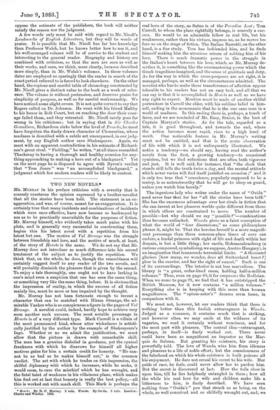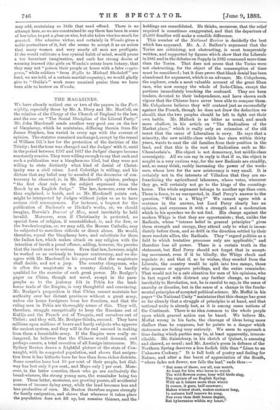TWO NEW NOVELS.*
Ma. MIIRRLY in his preface criticises with a severity that is scarcely courteous the opinion expressed by a brother-novelist that all the stories have been told. The statement is an exaggeration, and was, of course, meant for an exaggeration. It is -certainly true that many incidents and combinations of incidents which were once effective, have now become so hackneyed by use as to be practically unavailable for the purposes of fiction. Mr. Murray himself, who evidently takes much pains with his plots, and is generally very successful in constructing them, begins this his latest novel with a repetition from his latest but one. The motive of Val Strange was the struggle between friendship and love, and the motive of much, at least, of the story of Hearts is the same. We do not say that Mr. Murray does not introduce so much difference into his second treatment of the subject as to justify the repetition. We think that, on the whole, he does, though the resemblance will certainly suggest itself to any reader of the two novels, and will probably diminish the pleasure that is given by the second. To enjoy a tale thoroughly, one ought not to have lurking in 'one's mind even a suspicion that one has seen the same thing, or something very like the same thing, before. It is obvious that the impression of reality, in which the success of all fiction mainly lies, must be more or less impaired by the thought.
Mr. Murray has not been fortunate enough to invent a 'character that can be matched with Hiram Strange, the admirable Yankee who is so conspicuous a figure in the pages of Val Strange. A novelist could, indeed, hardly hope to achieve very soon another such success. The most notable personage in Hearts is of a very different type. Mark Carroll is a villain of the most pronounced kind, whose titter wickedness is artistically justified by the author by the example of Shakespeare's Iago. Whether or no we admit the justification, we must allow that the picture is drawn with remarkable skill. The man has a genuine disbelief in goodness, yet the cynical frankness with which he disavows for himself all higher motives gains for him a certain credit for honesty. "He cannot be as bad as he makes himself out," is the common verdict. The art with which he trades on this impression, the skilful diplomacy with which he increases, while he seeks, it would seem, to cure the mischief which he has wrought, and the fatal taint of weakness in his villainous plans, which makes him find out at last that honesty is really the best policy,—all this is worked out with much skill. This Mark is perhaps the real hero of the story, as Satan is of the Paradise Lost ; Tom Carroll, to whom the place rightfully belongs, is scarcely a success. He would be an admirable fellow in real life, but his weaknesses, rather than his virtues, impress us, as he moves be. fore us on the stage of fiction. The Italian Barretti, on the other hand, is a fine study. Tom has befriended him, and he finds himself making him the atrocious return of robbing him of his love. There is much dramatic power in the struggle in the Italian's heart between his love, which. as Mr. Murray describes it, is something like the overmastering power which the Greek tragedians imagined, and the sense of gratitude and duty. As for the way in which the cross-purposes are set right, it is managed, perhaps, as well as the circumstances admitted. The novelist who has to make these transferences of affection appear tolerable to his readers has not an easy task, and all that we can say is that it is accomplished in Hearts as well as we have any right to expect. Mention must be made of another skilful portraiture in Carroll the elder, with his sublime belief in himself, ending in the monomania that he is the one sane man in a world of madness. In this ending there is, perhaps, a touch of farce, and we are reminded of Mr. Easy, Senior, in the best of Captain Marryat's stories. As for the tale, regarded as a tale, it is good throughout, and towards the end, where the action becomes more rapid, rises to a high level of merit. One noticeable feature in Mr. Murray's writing must not be omitted, and that is the acute observation of life with which it is not unfrequently illustrated. We notice a tendency—we should say, having read the author's novels from the first, a growing tendency—to occasional cynicism, but we find reflections that are often both vigorous and just. It is well said, for instance, that "the clock that stands still tells the truth twice a day, and the mental attitude which never varies will find itself justified on occasion ;" and it is only too true that "conscience, popularly supposed to be a sentry, is so untrustworthy that he will go to sleep on guard, unless you watch him keenly."
The ingenious lady who writes under the name of " Ouida " need never fear that for her "all the stories have been told." She has the enormous advantage over her rivals in fiction that she can invent at her pleasure worlds quite different from those in which others are constrained to move. The number of possible—but why should we say "possible ?"—combinations thus becomes unlimited. Wanda gives us a faint conception of what the world of "four dimensions," as some philosophers phrase it, might be. That the heroine herself is a more magnificent personage than these common-place times of ours can endure, a feudal princess with right of life and death within her domain, is but a little thing ; her castle, Hohenszabrasburg (a curious compound, symbolising, we suppose, Austro-Hungary), is an imagination that transcends terrestrial limits. "A thousand glaciers [how many, we wonder, does all Switzerland boast 11 glow in the sunrise, and bar the sight of sunset." Such is one of its surroundings. The interior is not less marvellous. The library is "a great, cedar-lined room, holding half-a-million volumes." Thus, even on page 60, it far surpasses the Bodleian. When we come to page 91, we find that it has outstripped the British Museum, for it now contains "a million volumes." Everything else is in keeping with this more than human magnificence. The " opium-eater's " dreams seem tame, in comparison with it.
We must not, however, let our readers think that there is nothing better than this foolish extravagance in Wanda. Judged as a romance, it contains much that is striking, and however often we may smile at the wildness of its vagaries, we read it certainly without weariness, and for the most part with pleasure. The central idea—extravagant, perhaps, in itself—is finely worked out. There never could have been so magnificent an impostor as the Marquis de Sabran. But granting his existence, his story is powerfully told. The love of Wanda wins him from idleness and pleasure to a life of noble effort; but the consciousness of the falsehood on which his whole existence is built poisons all his enjoyment. He dare not reveal his secret to his wife. Her pride of race, he feels, could never allow her to pardon him. But the secret is discovered at last. How the toils close in upon him, till he lies helplessly entangled in them ; how all the while his real love for wife and children make life a bitterness to him, is finely described. We have seen nothing from " Ouida's " pen that struck us as being, on the whole, so well conceived and so skilfully wrought out, and, we may add, containing so little that need offend. There is no attempt here, as we are constrained to say there has been in some of her tales, to put a gloss on vice, but she takes vice too much for granted. She admires virtue, and certainly in Wanda gives a noble portraiture of it, but she seems to accept it as an axiom that many women and very nearly all mon are profligate. If she would cultivate a less cynical habit of mind, would prune a too luxuriant imagination, and curb her strong desire of seeming learned (the girls on Wanda's estate learn botany, that they may not "poison their people at home with a false cryptograns," while soldiers "from Scylla to Michael Skobeleff " are fond, we are told, of a certain martial coquetry), we would gladly give to " °aide's " work more unmixed praise than we have been able to bestow on Wanda.



































 Previous page
Previous page